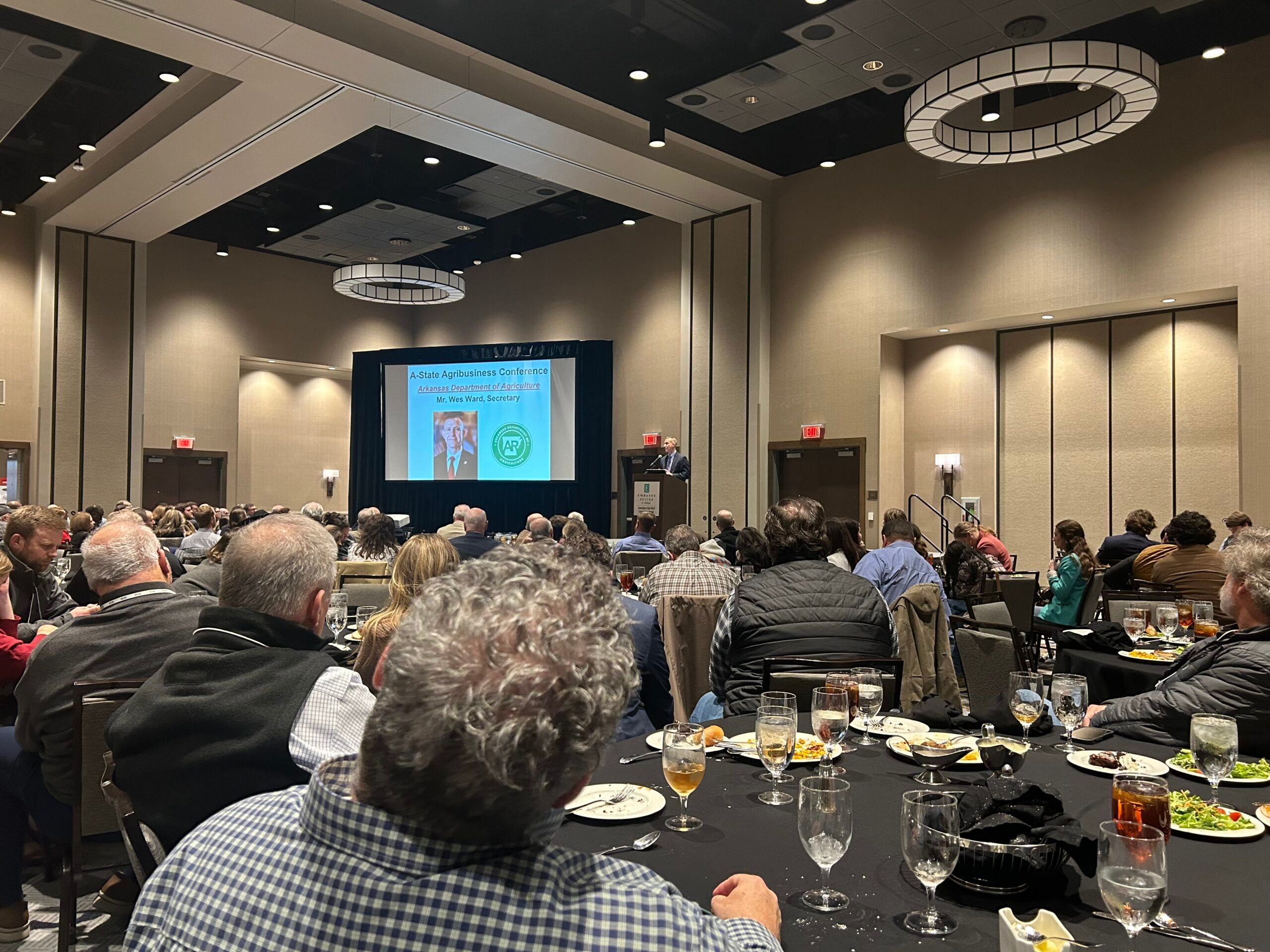This report from DDNS Reporter Shailey Wooldridge

Agriculture officials at Arkansas State University predict a challenging year for Arkansas agriculture. Farmers are expected to face difficulties in three areas: farm economy, agricultural and trade policy, and commodity markets.
Bert Greenwalt is a professor of agricultural economics at Arkansas State University. He said Arkansas agriculture is facing headwinds this year as farmers struggle with commodity prices decreasing over past years while farm input prices have declined very little.
“Farmers are in a cost-price squeeze situation, as it’s referred to, low profitability, struggling to make ends meet and looking to government, farm policy, the farm bill for some assistance,” Greenwalt said. “Unfortunately, our Farm Bill expired a couple of years ago and Congress has yet to address updates in the farm bill that would address the current situation.”
The Farm Bill is federal legislation passed by Congress governing various agricultural and food policies. It’s passed approximately every five years and covers a wide range of topics, from farm subsidies to food assistance programs. The bill affects farmers, ranchers, rural communities, consumers, and the environment.
“Agriculture is a cyclical business. Historically, there are ups and downs, like in some other businesses, and so we’re going through that downturn down cycle right now,” Greenwalt said. “Agriculture will continue to be an important industry in the United States and globally, but not all producers will remain in the industry over time.”
Greenwalt said one of the factors contributing to uncertainty in the agricultural economy today is the shifting trade policy in Washington. Since U.S. agriculture relies heavily on export markets, any disruptions, such as tariffs or trade wars, that affect trade or access to global markets are a significant concern for the industry.
“Farmers this time of year are making many plans for the coming year, what to plant, how to renew their lines of credit with lenders. So hopefully, some of this information will be useful to them as they complete their business planning for the season,” Greenwalt said.
Greenwalt is the co-founder and director of the annual Agribusiness Conference at Arkansas State University, which was held earlier in February. Keynote speaker at the conference Wes Ward addressed water infrastructure, food insecurity, and trade initiatives.
The Arkansas Department of Agriculture (ADA) secretary highlighted problems with water and wastewater systems across the state, including broken systems that have made it hard for people to access clean water.
He also addressed a decline in groundwater levels and the importance of ensuring enough water for irrigation in agriculture, which is crucial for the state’s economy.
“In August last year, we signed an executive order to update the state water plan. The deal is a comprehensive way to look at the needs for water resources throughout the state, both short term and long term,” Ward said. “Right now, there’s about $13 billion in water and wastewater infrastructure needs that impact every single one of us throughout the entire state.”
To address this, he said the state is working on two large irrigation projects to shift water use from groundwater to surface water for agriculture in eastern Arkansas. This will help ensure farmers have the water they need to grow crops.
In 2023, the USDA ranked Arkansas the worst state for food insecurity. Ward said the ADA staff is working to address this.
“A lot of what we’re focusing on this legislative session is just efficiency. We are working a lot about ensuring we’re working on food insecurity issues, but more so trying to identify and correct inefficiencies in government,” Ward said. “I would just ask if people are aware of issues on the state level, if there are things that we can do differently from an agriculture department, please don’t hesitate to visit us.”
Ward said there have been discussions about improving trade relations and access to markets for U.S. agricultural products. The ADA is working with NASDA and USDA to overcome barriers in international trade.
In January, a group from several U.S. states, including Arkansas, Montana, South Dakota, and Connecticut, traveled to India. Ward said the trip aimed to help open markets for U.S. agriculture, tackle trade challenges, and advocate for U.S. farmers.
“We can have a long conversation about India and what that might mean, but India’s the most populated country in the world; hopefully, in the future, there will be some good market opportunities, “ Ward said.
Haleigh Jackson, a graduate student majoring in Agriculture Business and Economics from Leachville, Arkansas, said staying current on agricultural issues and policy is crucial because they affect everyone in the farm sector.
“Agriculture touches everything,” Jackson said. “I think it’s good for everybody to come and learn about the things they use in everyday life.”
Scott Adams, land manager for Adams Land Company in Leachville, Arkansas, and owner of Buffalo Island Farms in Manila, Arkansas, has attended this conference for the past 19 years.
“The major take from it is, we’re going to have to get creative on restructuring entities, market, our crop during rallies, watch our inputs, where we can watch our inputs and just mind the situation and do our best to weather the storm if this is what we’re going to continue to try o do,” Adams said. “My biggest concern is the family farmer going away, smaller farms being dissolved into bigger farms, and it affecting our direct economy.”
######
More here:
Arkansas Farmers Face Significant Challenges This Season. Article may or may not reflect the views of KLEK 102.5 FM or The Voice of Arkansas Minority Advocacy Council





Comments